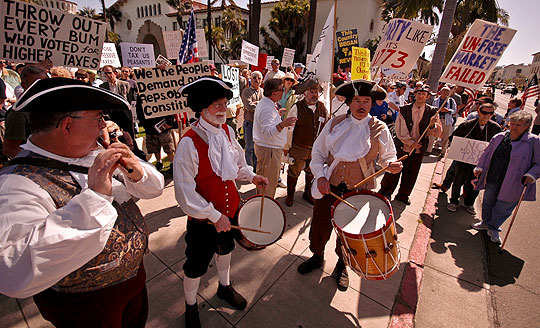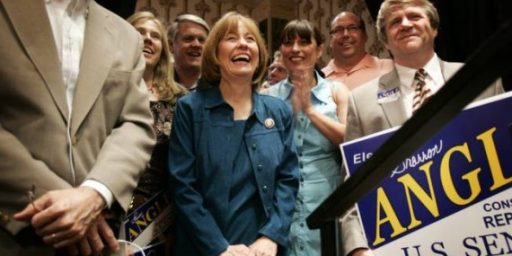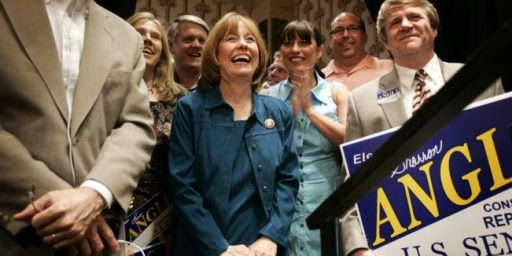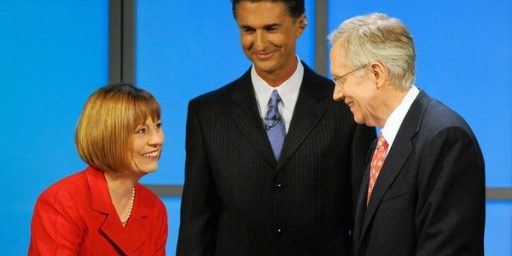Election Results Are A Mixed Verdict For The Tea Party
Last night's election results stand as a mixed verdict on the Tea party and its impact on the Republican Party.
On a broad level, last night’s election results are somewhat of a mixed bag for the Tea Party movement that took root some 18 months ago in the wake of public opposition to bailouts and health care reform:
The Tea Party movement set the agenda in its first midterms, its energy propelling the Republican sweep in the House and capturing the mood of a significant chunk of the electorate, with a remarkable 4 in 10 voters in exit polls expressing support for the movement.
But in the Senate, the effect was exactly what establishment Republicans had feared: While Tea Party energy powered some victories, concerns about Tea Party extremism also cost them what could have been easy gains — most notably in Nevada, where the Senate Democratic leader, Harry Reid, survived a challenge from Sharron Angle, a Tea Party favorite.
Now, as it tries to make the transition from a protest movement to a power on Capitol Hill, the Tea Party faces the challenge of channeling the energy it brought to the election into a governing agenda when it has no clear mandate, a stated distaste for the inevitable compromises of legislating, and a wary relationship with Republican leaders in Congress.
For many voters the Tea Party has been a blank screen on which they have projected all kinds of hopes and frustrations — not always compatible or realistic.
To many in the movement, the singular goal is to stop an expanding government in its tracks, to “hold the line at all hazards,” as Jennifer Stefano, a Tea Party leader in Pennsylvania, put it.
But the movement is also animated by a belief that the entire political system has become disconnected from the practical needs and values of Americans, suggesting that its voting power stemmed as much from a populist sense of outrage in a tough economic moment as it did from ideology. What many of its adherents want as much as anything is for the two parties to come together to solve problems.
That sometimes conflicting mandate was neatly captured by two interviews in Searchlight, Nev., hometown of Mr. Reid, who became the Tea Party’s biggest target. “I want to see gridlock,” said Ronald Hanvey, who supported Ms. Angle. “I don’t want to see any more laws.”
A few months earlier on nearly the same spot, Jeff Church, arriving at a Tea Party rally against Mr. Reid, complained equally about the state’s Republican senator, John Ensign, and yearned for bipartisanship. “Why can’t they get along and make some common-sense solutions?” Mr. Church asked.
In the Senate, the Tea Party carried to victory Marco Rubio in Florida and Rand Paul in Kentucky. Still, it cost the Republicans some seats that they had once counted as solid, including one in Delaware, where Christine O’Donnell, who beat an establishment candidate in the primary thanks to strong Tea Party support, lost to Chris Coons, a Democrat once considered a long shot.
Even more painful for Republicans was the result in Nevada. Mr. Reid, once considered the most vulnerable Democrat, fought off Ms. Angle, who had made headlines for her controversial and sometimes eccentric remarks.
House races showed the same win-loss effect.
Hans Bader is among those laying the blame for the failure to take control of the Senate squarely on the Tea Party movement:
By intervening in GOP Senate primaries in Delaware, Nevada, and Colorado, in favor of candidates who went on to lose the general election to relatively unpopular Democratic incumbents, the Tea Party Express ensured continued Democratic control of the Senate. The GOP picked up no more than six seats in the Senate, leaving it with at most 47 seats out of 100. By contrast, in the House of Representatives, where the Tea Party Express played much less of a role in selecting GOP nominees, the GOP took control of the House, picking up more than 60 seats.
(…)
Had Delaware’s Christine O’Donnell not been nominated, the nominee would have been veteran moderate Republican Congressman and former governor Mike Castle, who was widely popular in Delaware, and was endorsed by New Jersey Chris Christie (hardly a liberal RINO — Christie won a straw poll among Virginia Tea Partiers). Castle would have crushed liberal Chris Coons in the election. Instead, thanks to Castle’s loss to O’Donnell in the primary (where independent voters could not vote in favor of Castle), Coons easily defeated O’Donnell.
Had Sharron Angle not been nominated in Nevada, the nomination would have instead gone to Sue Lowden, a telegenic candidate with little political baggage who comfortably led Senate Majority Leader Harry Reid in polls, and would have ousted him in November, putting her on a shortlist of potential future GOP vice presidential picks, and obviating the need for a Republican nominee seeking a female vice presidential pick to pick someone with more political baggage, like 2008 vice presidential nominee Sarah Palin, who probably cost McCain at least as many votes as she brought him.
The same could be said about the nomination of Ken Buck in Colorado. Had former EPA Administrator Jane Norton won the primary instead, she likely would have had a far better chance against Bennett than Buck did, and she wouldn’t have made some of the verbal gaffes that got him into trouble during the course of the election either.
Hindsight is 20/20, and of course you cannot say with certainty what would’ve happened had different candidates been nominated in Delaware, Nevada, and Colorado, but it’s fairly clear that the selection of Christine O’Donnell, Sharron Angle, and Ken Buck, among others, created a situation that made GOP control of the Senate next year an impossibility. More importantly, as Bader notes, the logic behind the selection of such candidates ignores some fundamental truths about American politics:
Many conservative activists and bloggers think that there is a silent majority of conservatives in every state, based on the fact that their own circle of friends is overwhelmingly conservative. Unfortunately for them, that’s just not true. Most people don’t have much ideology at all, and many that do have an ideology are not conservative. Obama’s low poll results are primarily the result of a bad economy, and secondarily the result of his policy failures and mistakes, not the result of some great conservative awakening. The public is not outraged enough at Obama to vote for anyone who opposes him, no matter how conservative. Indeed, the public finds certain principled conservative positions disturbing, just as it finds certain Obama liberal positions disturbing. People who think the country is conservative beneath the surface are living in a bubble, just like the Obama supporters were deluding themselves when they came to the conclusion that the country had become staunchly liberal just because Obama won in 2008 based on the bad economy.
One example of that can be found in Nevada, where the Republican candidate won the Governor’s race by nearly 100,000 votes at the same time that Harry Reid, who had entered the election with astronomically high negative approval numbers for an incumbent, defeated Sharron Angle by more than 40,000 votes. That in itself is evidence that, while Nevada voters were inclined to vote for a conservative candidate, they were not so inclined when it came to a conservative candidate with a history off odd statements and a disturbing relationship with the media. The same lesson can be seen in Alaska, where Tea Party candidate Joe Miller looks likely to be defeated by a write-in vote from a Republican incumbent Senator who based much of her campaign on the argument that Miller was too conservative, and too inexperienced, to represent Alaska in the Senate. That message seems to have worked, and while the result in Alaska will not cost the GOP a seat, it stands alongside the other losses as a message to the GOP and the Tea Party that they can’t just nominate their dream candidate without consideration for what could happen to them in the General Election







Well, at least rationalization is more becoming than weeping and Gnashing of teeth![lol]
Here in Illinois, we elected Democrat Mark Kirk, cleverly disguised as Republican Mark Kirk…
a sort of a late Trick and/or treat!
That last quote hits the nail on the head. Well, aside from the fact that I really doubt many Obama supporters assumed the country became staunchly liberal in 2008; it’s not like the Democrats and Obama pressed for many liberal policies in the last few years. (No, the health care reform bill was NOT very liberal.)
You will listen to the people or you will not, you will go by the constitution or you will not. The choices are simple. The people rule this day!
I am so happy that I live Wisconsin, so happy, :):):):):):):):):):)……
The Tea Party came out of nowhere without any formal organization, structure, or funding and did better than the Democrats yesterday. I think a lot of incorrect conclusions are being drawn about the phenomenal success of the Tea Party.
As to blame, the Republicans are lucky they didn’t take over the Senate this election. Nothing like having Harry Reid as the face of the party in Congress for the next two years heading into the next election where a lot more Democrats’ seats are up than Republicans in the Senate.
> formal organization, structure, or funding and did better than the Democrats yesterday
So the news flash here is that you have not figured out who “the tea party” is fronting for yet…
No, the news flash is that you are still a conspiracy nut.
Thanks for linking to my post about the Tea Party Express harming the GOP.
Note, however, that I didn’t exclusively blame it for the loss. Other factors were just as big. The NRSC’s wasting millions on a futile California Senate bid rather than on swing state races was also to blame (the state of California is too liberal and too pro-abortion to be won by a pro-life candidate in a high-profile race). The lack of a GOTV operation on the GOP side also was a huge factor.
Absent any of these three factors, the GOP would have had a chance of winning control of the Senate.
Obama’s policies have offended not just conservatives, but also fiscally responsible moderates. Harvard’s Jeffrey Miron and Robert Barro have criticized his failed, wasteful stimulus package, as has Nobel Prize winning economist Vernon Smith. Obamacare was drafted so sloppily that it contains disincentives to work that will eliminate hundreds of thousands of jobs.